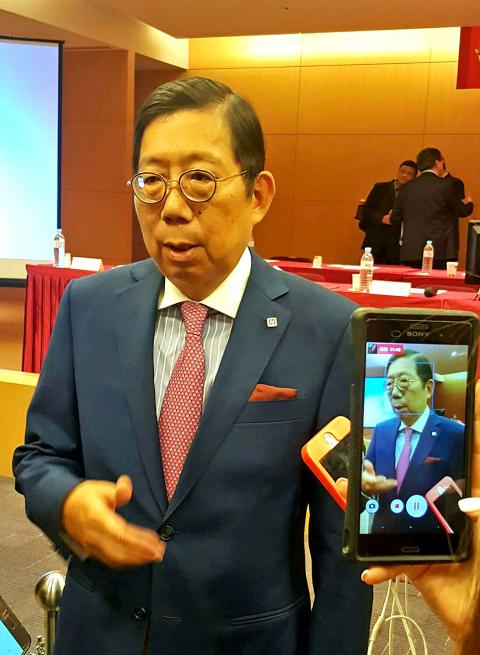Taiwan Mobile Co (台灣大哥大) is studying the possibility of investing in the telecom markets of India and Indonesia, company chairman Richard Tsai (蔡明興) said at the annual general meeting.
Tsai told shareholders that the two markets offer good potential for growth, so the company is evaluating opportunities to invest there.
He said that while India already has many telecom services providers, leading to intense competition and a price war, it has a huge population, creating business opportunities, in particular in data transmission, which is expected to rise.

Photo: CNA
Tsai said that Taiwan Mobile is evaluating the likelihood of teaming up with local telecom operators to win a slice of the 4G market at a time when the Indian market is migrating to 4G technology.
However, any plans about investment in India still needs time to be finalized, he said.
In addition to the expansion in telecom services overseas, Tsai said that Taiwan Mobile has been eying the e-commerce potential in Southeast Asia, adding that Momo.com Inc (富邦媒), its e-commerce subsidiary, has been gearing up to explore the markets in the Philippines and Vietnam.
In particular, Momo.com is seeking a business partner in the Philippines and an agreement on a strategic partnership is expected to be reached by the end of this year, he said.
Taiwan Mobile holds a 51 percent stake in Momo.com, which has been listed on the local main board since December 2014.
In Thailand, Momo.com owns a 35 percent stake in e-commerce operator TVD Shopping.
Tsai said that TVD Shopping has become profitable and is planning to file an application next year to list its shares in Thailand’s stock market.
In Taiwan, Taiwan Mobile is determined to develop its third-party payment business, Tsai said, adding that the company is planning to start an over-the-top (OTT) content business by signing up for good drama series and movies from across the Taiwan Strait.
OTT content can be transmitted through delivery of audio, video and other media over the Internet without the involvement of a multiple-system operator.
Tsai said that Taiwan Mobile has set a target of boosting the number of its 4G subscribers to 5 million next year, up from 3 million at the end of last year, by encouraging existing 2G and 3G subscribers to migrate to 4G.
Shareholders approved a proposal for Taiwan Mobile to distribute NT$5.6 in cash dividends based on last year’s earnings per share of NT$5.76 for a payout ratio of 97 percent.

Taiwan will prioritize the development of silicon photonics by taking advantage of its strength in the semiconductor industry to build another shield to protect the local economy, National Development Council (NDC) Minister Paul Liu (劉鏡清) said yesterday. Speaking at a meeting of the legislature’s Economics Committee, Liu said Taiwan already has the artificial intelligence (AI) industry as a shield, after the semiconductor industry, to safeguard the country, and is looking at new unique fields to build more economic shields. While Taiwan will further strengthen its existing shields, over the longer term, the country is determined to focus on such potential segments as

UNCERTAINTY: Innolux activated a stringent supply chain management mechanism, as it did during the COVID-19 pandemic, to ensure optimal inventory levels for customers Flat-panel display makers AUO Corp (友達) and Innolux Corp (群創) yesterday said that about 12 to 20 percent of their display business is at risk of potential US tariffs and that they would relocate production or shipment destinations to mitigate the levies’ effects. US tariffs would have a direct impact of US$200 million on AUO’s revenue, company chairman Paul Peng (彭雙浪) told reporters on the sidelines of the Touch Taiwan trade show in Taipei yesterday. That would make up about 12 percent of the company’s overall revenue. To cope with the tariff uncertainty, AUO plans to allocate its production to manufacturing facilities in

Chizuko Kimura has become the first female sushi chef in the world to win a Michelin star, fulfilling a promise she made to her dying husband to continue his legacy. The 54-year-old Japanese chef regained the Michelin star her late husband, Shunei Kimura, won three years ago for their Sushi Shunei restaurant in Paris. For Shunei Kimura, the star was a dream come true. However, the joy was short-lived. He died from cancer just three months later in June 2022. He was 65. The following year, the restaurant in the heart of Montmartre lost its star rating. Chizuko Kimura insisted that the new star is still down

While China’s leaders use their economic and political might to fight US President Donald Trump’s trade war “to the end,” its army of social media soldiers are embarking on a more humorous campaign online. Trump’s tariff blitz has seen Washington and Beijing impose eye-watering duties on imports from the other, fanning a standoff between the economic superpowers that has sparked global recession fears and sent markets into a tailspin. Trump says his policy is a response to years of being “ripped off” by other countries and aims to bring manufacturing to the US, forcing companies to employ US workers. However, China’s online warriors